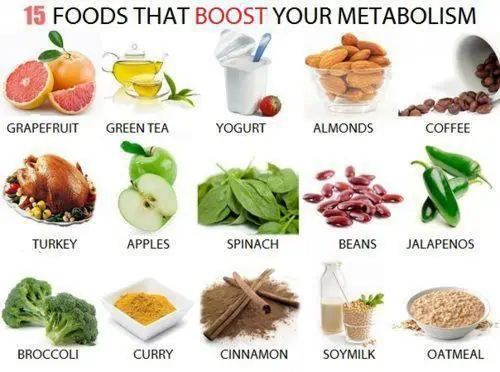“Increase metabolism” refers to how efficiently your body can take the food and drink you consume and break it down for energy. In short, it is a continuous process that does one of three things.
- Burn Fat
- Store Fuel
- Build Muscle
Table of Contents
How Can I Increase My Metabolism Naturally?
Some of the natural ways to increase metabolism:
- Does protein increase metabolism?
- Protein can increase metabolism by boosting the thermic effect of food, which is the energy required to digest and absorb food. Protein has a higher thermic effect than fats and carbohydrates and can also help build muscle mass, which burns more calories at rest.
- Does drinking water increase your metabolism?
- Drinking water can increase metabolism by stimulating thermogenesis, the energy required to heat the water to body temperature. Studies have shown that drinking water can boost your metabolic rate by 24–30% for an hour and help you burn more calories.
- Does HIIT increase metabolism?
- HIIT can increase metabolism by boosting the amount and activity of proteins in energy metabolism and muscle contraction. HIIT also improves glucose metabolism, insulin sensitivity, and fat burning, especially in people with type 2 diabetes. HIIT is a time-efficient and enjoyable way to exercise for health benefits.
- Does weightlifting increase metabolism?
- Weight lifting can increase your metabolism by building and retaining muscle mass, which is more metabolically active than fat. Weight lifting also helps prevent the drop in metabolism that can occur with weight loss. Strength training is one of the best ways to boost your metabolism and burn more calories.
- Does walking increase metabolism?
- Walking can increase your metabolism by building more leg muscles and stimulating blood circulation. Walking for at least 30 minutes daily can also help burn calories, improve heart health, and reduce stress. Walking is a simple and effective way to boost your health.
- Does coffee increase metabolism?
- Coffee and green tea can increase metabolism by stimulating the central nervous system and promoting fat burning. However, the effect may vary depending on the dose, type, and individual tolerance of caffeine. Coffee is not a magic bullet for weight loss, but it can support a healthy lifestyle. To enhance the caffeine effects, drink catechins containing Green tea.
- Does spicy food increase metabolism?
- Spicy food can increase your metabolism by producing heat in the body and burning more calories, according to a registered dietitian. However, the effect is temporary and insignificant, so it won’t help you lose weight. It would help if you still had a balanced diet and exercise.
- Does sleep increase metabolism?
- Sleep can affect your metabolism in several ways, such as regulating your appetite hormones, improving your energy levels, and supporting your body’s repair processes. Getting enough quality sleep can help optimize your metabolism and prevent weight gain.
- Should we take supplements to increase metabolism?
- Some supplements may help boost metabolism, but they are not a substitute for a healthy diet and lifestyle. Some vitamins and minerals, such as B vitamins, vitamin D, calcium, iron, and magnesium, may also support your metabolism.
These actions may also increase metabolism permanently. However, consult your doctor before taking any vitamins or supplements to ensure they are safe and suitable.
Foods that Increase Metabolism and Burn Fat
Some foods that may increase your metabolism and burn fat are:
- Protein-rich foods
- Mineral-rich foods
- Chili peppers
- MCT oil
- Water
- Fatty fish
- Oolong tea
- Greek yogurt
- Olive oil
- Apple cider vinegar

These are some of the foods that may increase your metabolism and burn fat. However, these foods are not magic bullets, and you must follow a balanced diet and exercise regularly to achieve or maintain a healthy weight.
Exercise to increase metabolism
Exercise can increase metabolism in various ways and for different durations:
Moderate to high-intensity exercise can increase energy expenditure for at least 22 hours following the exercise.
Exercise that works large muscle groups can impact the body’s metabolic process. So, depending on the individual and the exercise regimen, it could range from several hours to days.
Exercises that Increase Metabolism
- Walk Daily
A daily walking activity like taking a quick stroll after lunch, taking stairs instead of an elevator, or walking instead of driving can fit into any lifestyle, burning extra calories and increasing metabolism.

- Lift Weights
Three times more calories are used to maintain muscle cells than fat cells, so lifting weights and packing on some muscle can increase your metabolic rate.
Even if muscle building isn’t one of your primary fitness goals, weekly weightlifting sessions can significantly increase the calories burned.
- Interval Sprints
30-second high-energy Interval sprints at full speed burn many calories and increase your metabolism significantly.
- Do some bodyweight exercises.
Bodyweight exercises are an excellent way to burn calories and give your muscles a workout when you have a few minutes to spare, thereby increasing metabolism effectively.
- Consider getting a cardio machine.
Replace your couch with a cardio machine like a treadmill, a cycle, or an elliptical. You can burn many calories while watching your favorite TV shows, increasing your metabolism.

- Focus on Fun
If you want to maximize the number of calories you burn daily, choose activities that you find fun, and you are much more likely to stick with them, increasing your metabolism.
- Create a High-Powered Workout Playlist
Music is a powerful tool that can make a massive difference in burning calories during your workout. The right tracks at the right time can motivate you to keep going when you would generally give up, help you smash through plateaus, and increase your metabolism.
- Be Consistent
As with many things, consistency is the key to keeping your metabolism up. So, whether you implement some or all of these metabolism-boosting strategies, make sure you are consistent and get some exercise daily.
- Take time to rest.
Proper rest and recovery are as important as the workout itself. Overtraining and failing to get enough sleep can slow your metabolism, reduce the calories you burn during workouts, and cause injuries.
Signs You Need a Metabolism Boost
- Weight Gain
- Dry Skin
- Constant Headache
- Constipation
- Difficulty in losing weight
- Chronic Fatigue
- Sugar Cravings
- Depression

Metabolism Killers
Researchers observed that aging is connected with a gradual drop in basal metabolic rate.
Moreover, several regular practices might deplete your metabolism. Beware of these metabolism killers,
- Alcohol
- Diary
- Gluten
- Caffeine overload
- Excessive meat
- Artificial sweeteners
- Dehydration
- Sugar
- Corn
- Soy
- Packaged foods
- Skipping meals
- Lack of sleep
- GMO foods
- No organic fruits & veggies
Conclusion
So, when it comes to increasing metabolism for weight loss, it is the rate at which you burn calories. While metabolism is partly genetic, environmental factors such as activity level, sleep patterns, and stress can affect your metabolism, too.





